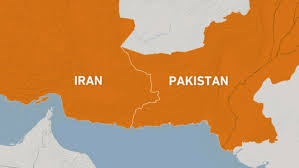
There are several factors behind Iran's decision to launch an attack on Pakistan
Prior to its actions in Pakistan, Iran had already engaged in military activities in Syria and Iraq
Iran has placed Pakistan in the same category as Iraq and Syria
Pakistan, considered the most vulnerable among countries with nuclear capabilities, is led by politically and militarily feeble and hesitant leaders.
Recently, Iran carried out missile and drone strikes within Pakistani territory. These attacks, as claimed by some Iranians, targeted the Sunni militant group Jaish Al-Adl. The Balochistan region, historically divided between Iran and Pakistan, is the site of conflicts where the Baloch people are striving for autonomy or independence from both nations. The insurgent activities in the Balochistan area of Pakistan are notably more severe than those in Iran.
There are several factors behind Iran’s decision to launch an attack on Pakistan:
Pakistan has limited means to retaliate against Iran
– They can officially denounce the attack at a high level and either recall their ambassador or downgrade diplomatic relations. This step has already been taken by Pakistan in recalling its ambassador.
– Conduct operations against Baloch insurgents who are allegedly sheltered in Iran.
– Engage in military action by targeting Iranian military bases.
However, attacking Iranian military facilities could either lead to war or another active conflict along Pakistan’s western border, a situation Pakistan is unlikely to want. The most Pakistan might do is to launch a few missiles into the deserts of Iranian Balochistan to appease its domestic audience. But the most probable course of action is minimal beyond condemning Iran’s actions and reducing diplomatic ties. The United States and Saudi Arabia, recognizing Pakistan’s limitations, may not extend significant financial or military support to Pakistan in a conflict against Iran.
Over recent years, Pakistan has experienced airstrikes from American, Indian, and now Iranian forces, yet the Pakistani Air Force has been unable to detect and counter these strikes. This situation reflects on the preparedness of the Pakistani Armed Forces. Despite being the fifth largest army in the world on paper, in practical terms, they have struggled even to defend against the Taliban. While Pakistani soldiers may possess a strong sense of patriotism, their leadership has largely been ineffective. Pakistan has yet to achieve victory in any war throughout its history, yet its military generals continue to hold significant influence within the country.
(The author, Girish Linganna, is a Defence, Aerospace & Political Analyst based in Bengaluru. He is also Director of ADD Engineering Components, India, Pvt. Ltd, a subsidiary of ADD Engineering GmbH, Germany. You can reach out to him at: [email protected])

There are several factors behind Iran's decision to launch an attack on Pakistan
Prior to its actions in Pakistan, Iran had already engaged in military activities in Syria and Iraq
Iran has placed Pakistan in the same category as Iraq and Syria
Pakistan, considered the most vulnerable among countries with nuclear capabilities, is led by politically and militarily feeble and hesitant leaders.
Recently, Iran carried out missile and drone strikes within Pakistani territory. These attacks, as claimed by some Iranians, targeted the Sunni militant group Jaish Al-Adl. The Balochistan region, historically divided between Iran and Pakistan, is the site of conflicts where the Baloch people are striving for autonomy or independence from both nations. The insurgent activities in the Balochistan area of Pakistan are notably more severe than those in Iran.
There are several factors behind Iran’s decision to launch an attack on Pakistan:
Pakistan has limited means to retaliate against Iran
– They can officially denounce the attack at a high level and either recall their ambassador or downgrade diplomatic relations. This step has already been taken by Pakistan in recalling its ambassador.
– Conduct operations against Baloch insurgents who are allegedly sheltered in Iran.
– Engage in military action by targeting Iranian military bases.
However, attacking Iranian military facilities could either lead to war or another active conflict along Pakistan’s western border, a situation Pakistan is unlikely to want. The most Pakistan might do is to launch a few missiles into the deserts of Iranian Balochistan to appease its domestic audience. But the most probable course of action is minimal beyond condemning Iran’s actions and reducing diplomatic ties. The United States and Saudi Arabia, recognizing Pakistan’s limitations, may not extend significant financial or military support to Pakistan in a conflict against Iran.
Over recent years, Pakistan has experienced airstrikes from American, Indian, and now Iranian forces, yet the Pakistani Air Force has been unable to detect and counter these strikes. This situation reflects on the preparedness of the Pakistani Armed Forces. Despite being the fifth largest army in the world on paper, in practical terms, they have struggled even to defend against the Taliban. While Pakistani soldiers may possess a strong sense of patriotism, their leadership has largely been ineffective. Pakistan has yet to achieve victory in any war throughout its history, yet its military generals continue to hold significant influence within the country.
(The author, Girish Linganna, is a Defence, Aerospace & Political Analyst based in Bengaluru. He is also Director of ADD Engineering Components, India, Pvt. Ltd, a subsidiary of ADD Engineering GmbH, Germany. You can reach out to him at: [email protected])
